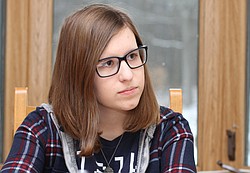Scout’s project allows blind children access to books

KINSMAN
Because Rachel Joyce Swym, a junior at Joseph Badger High School in Kinsman, loves books and could not imagine her life without them, students at a Pennsylvania school for the blind now have a library of cassette tapes loaded with children’s fairy tales and music to which they can listen.
About 18 months ago, Rachel, 16, came to her mother with the idea of bringing books and music to blind children as her Girl Scouts of USA Gold Award project.
The Gold Award, often compared to the Boy Scouts of America’s Eagle Award, is the highest achievement that can be earned by Girl Scouts and recognizes them for demonstrating leadership through projects that have sustainable impact in their communities and beyond.
Rachel enthusiastically admits she is obsessed with books.
She nearly always carries a book with her; and she has most of the writings of Shakespeare, her favorite author. In her Gustavus home, her room is filled wall-to-wall with books.
“I’m also a reader,” said Rachel’s mother, Crystal. “I even read to my belly when I was pregnant.”
Crystal and her husband, Kurt, also have a son, Kyle, 13, whom his mother says “plays every sport you can think of.”
Rachel is a captain of Joseph Badger’s quiz bowl team, for which she specializes in Shakespeare and capitals of countries of the world.
A 4.0 student, she is active in her school and community.
Besides competing on the quiz bowl team, Rachel is a member of her school’s Beta Club, National Honor Society, Spanish Club and the co-ed varsity golf team. She also tutors after school and volunteers at the Kinsman Free Public Library.
To accomplish her Girl Scout Gold Award project to make books and music available to blind and mentally disabled children, Rachel, one of five ambassadors of Girl Scout Troop 80009 based in Kinsman, involved other members of the troop and her family, school and community.
“I got to thinking that society doesn’t always accommodate the disabled and that there is a lack of awareness about the issue,” Rachel said explaining why she settled on her Gold Award project.
“She said if she didn’t have books available to her, she didn’t know what she would do,” her mother said.
“It was 18 months ago when Rachel came to me with her project idea. I didn’t know how she was going to make it work. I am in awe of what she has done,” said her mother.
She found the Western Pennsylvania School for Blind Children, a private charter school in Pittsburgh that agreed to work with her. The school accepts legally blind students from 3 to 21.
She convinced the Kinsman Volunteer Fire Department to allow her to have a car demolishing event, using sledge hammers and baseball bats, during the fire department’s 90th anniversary celebration last summer.
“I knew there would be a lot of people there. It raised $180,” she said. Including donations, she raised about $260 for her the project.
Teachers at Joseph Badger offered extra credit to students willing to record fairy tales on the cassette tapes in sound-proof rooms made available by Paul Faatz, the school’s vocal music and band director. Community members donated hundreds of cassette tapes.
Rachel said she is very grateful to her community, school and family for their support.
Finally, on Jan. 25, the project was complete after more than 100 hours of work. Rachel and her mother drove to the Early Childhood Department at the Western Pennsylvania School for Blind Children (WPSBC). There, Rachel presented tapes to nearly 100 students in grades 3-10 with a gift of age-appropriate fairy tales and music.
Some of the special students of the WPSBC are not only legally blind, they have additional challenges.
“Tape cassettes are the preferred method of listening for our pupils because tape player/recorders allow for switch integration. Through a variety of interfaces, switches can connect to electronic devices and work to turn things on and off or indicate choices. For children with physical disabilities, a single, reliable movement can turn a cassette player on. Those with sensory impairments learn that they can be the controlling source of sound and are provided new opportunities to learn and participate,” said Lynda Hedfors, WPSBC staff development specialist and school librarian.
“I’ve always loved books and reading, and it saddens me that there are people who can’t read, not out of choice, but out of inability. We forget sometimes that not everyone can do what we can,” said Rachel.
Rachel made an impression on the staff and students at the school for the blind.
“From the outset, I had no doubt that when she sets her mind to accomplishing a task, it would be done,” Hedfors said.
“If I didn’t know otherwise, I would have thought Rachel was a good deal older than 16 because she is so well-spoken and thoughtful and a good writer. She demonstrated a high level of thinking about all the things for which she was responsible and was very concerned about how the stories would be received by the students. Rachel even brought some cassette players in the event students would want to take materials home. Her project was very well thought-out. At the same time, we were pleased she acted like the teenager she is. I look forward to hearing of the great things Rachel will accomplish as she finishes high school and makes her way in the future,” Hedfors said.
“The WPSBC staff and the children loved the tapes. They were amazed that a teen would do this. Rachel was treated like a celebrity,” her mother said.
 43
43

